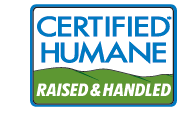When it comes to smarter eating, people are usually looking at three things: their health, animal welfare, and environmental sustainability. But it’s no secret that labels are misleading, and a lot of brands are catching flack for being deceptive. (As they should be.) I too have fallen for the words “free range” and “organic” thinking I was doing good by throwing my money at brands with these labels, but often times these labels have little meaning.
The best way to get around this is to do some homework and understand what labels and certifications mean. It can seem overwhelming at first, but you don’t have to become an all-knowing food detective to get it done.
Here, I’m focusing on labels related to animal welfare that represent more humane and transparent practices.

A Greener World (AFG): There’s some hostility surrounding food and farming today, and A Greener World prides itself on being an advocate of positive change. AFG promotes and supports real-life farming models to the public and offers realistic guidance on achieving truly sustainable livestock farming systems to farmers and ranchers. Their mission is to identify and promote agricultural systems that have a positive impact on the environment, society, and animals; to educate consumers about the environmental, social, and animal outcomes of their food purchasing decisions; to establish and promote trusted farm certification programs that help reconnect the consumer and food producer by encouraging and rewarding positive farm management changes; and to support independent farmers who are committed to sustainable livestock production.
Certified Humane® (CH): Humane Farm Animal Care (HFAC) is the leading nonprofit certification organization committed to bettering the lives of food production farm animals from birth to plate. The goal of the program is drive consumer demand for humane, kind, and responsible farm animal practices. If you see the Certified Humane Raised and Handled® label on a product, you can rest assured that the product has come from farms and facilities that meet clear-cut standards for farm animal treatment. Animals must have the freedom to do what comes naturally to them, like roam, flap their wings, and dust-bathe. Animals cannot be kept in cages, crates, or tie stalls, and they must be given proper space and shelter. In order to limit stress, it’s also imperative that the animals are handled with care. The animals must also have plenty of fresh water and be fed a healthy diet of quality feed—no animal by-products, added antibiotics, or hormones.

Global Animal Partnership (GAP): The Global Animal Partnership is a non-profit organization of farmers, scientists, retailers, manufacturers, and animal advocates who are all collaborating to improve the lives of farm animals. On their Website, you can click to view their standards by species, read about their 5-step program, and find GAP partners.
If you have a Whole Foods Market near you, that makes things even easier! Almost all of the beef, chicken, pork, and turkey available at Whole Foods is Global Animal Partnership certified and labeled—so you can shop there with confidence.
If you’re having trouble finding these animal-friendly brands at your local supermarket, present them with a customer request letter to show them that there’s a demand for ethical products!






